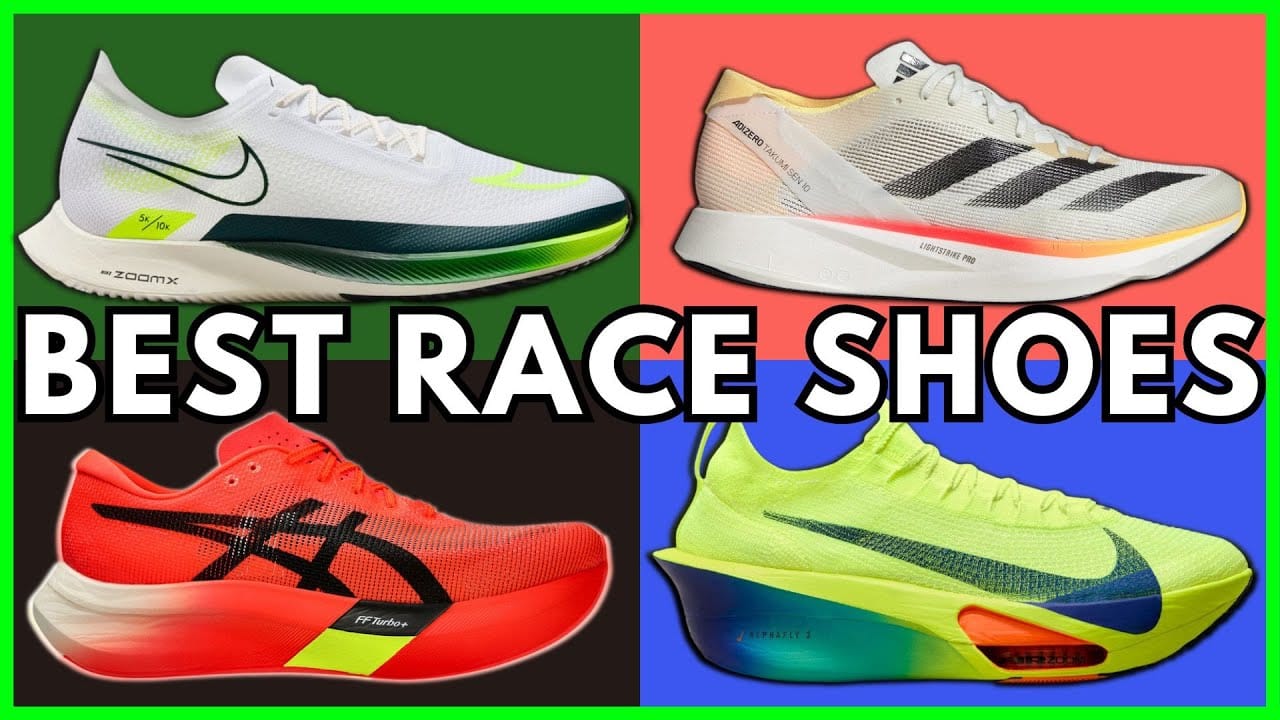Best Running Shoes for 5K And 10K

The best running shoes for 5K and 10K races are lightweight, comfortable, and provide excellent support. Top brands include Nike, Asics, and Brooks.
Running a 5K or 10K race requires the right gear to optimize performance and reduce injury risk. Choosing the best running shoes is crucial for achieving your personal best. Lightweight shoes with good cushioning and support help maintain speed and comfort throughout the race.
Popular options from brands like Nike, Asics, and Brooks offer specialized designs tailored for short to mid-distance runs. Ensuring a proper fit and considering your running style can significantly enhance your race experience. Investing in quality running shoes can lead to better performance and a more enjoyable run.

Credit: www.instagram.com
Introduction To Running Shoes
Choosing the right running shoes is crucial for any runner. Whether you’re running a 5K or a 10K, the right footwear can enhance performance and prevent injuries. Let’s dive into the importance of proper footwear and the types of running shoes available.
Importance Of Proper Footwear
Wearing the right running shoes can prevent foot pain and injuries. Proper shoes provide the necessary support and cushioning. They help in maintaining the correct posture during your run.
Good shoes can enhance your running efficiency. They can also reduce fatigue, allowing you to run longer distances comfortably.
Types Of Running Shoes
There are several types of running shoes tailored to different needs. Here are the main categories:
- Neutral Shoes: These are for runners with a normal gait. They offer balanced support and cushioning.
- Stability Shoes: Ideal for those who overpronate. They provide extra support to the inner foot.
- Motion Control Shoes: Best for severe overpronators. They offer maximum support and control.
- Trail Running Shoes: Designed for off-road trails. They have better grip and durable soles.
- Minimalist Shoes: These have less cushioning. They promote a natural running form.
Here is a table summarizing the different types of running shoes:
| Type | Best For |
|---|---|
| Neutral Shoes | Normal gait |
| Stability Shoes | Overpronation |
| Motion Control Shoes | Severe overpronation |
| Trail Running Shoes | Off-road trails |
| Minimalist Shoes | Natural running form |

Credit: www.reddit.com
Features To Look For
Choosing the right running shoes for 5K and 10K races is crucial. The right features can make a significant difference in your comfort and performance. Here are the top features to consider:
Cushioning
Good cushioning is essential for reducing impact on your joints. Look for shoes with soft yet responsive foam. The cushioning should provide a balance between comfort and performance. Too much cushioning can be heavy, while too little can cause discomfort. Popular choices include EVA foam and gel inserts.
| Material | Benefits |
|---|---|
| EVA Foam | Lightweight and responsive |
| Gel Inserts | Excellent shock absorption |
Arch Support
Proper arch support can prevent injuries and enhance comfort. Different runners have different arch types: flat, neutral, or high. Select shoes that match your arch type. Many shoes offer built-in arch support or removable insoles. This feature helps in maintaining the natural alignment of your feet.
- Flat Arch: Look for stability shoes.
- Neutral Arch: Neutral cushioning shoes work best.
- High Arch: Go for shoes with extra cushioning.
Breathability
Your feet need to stay cool and dry during the run. Choose shoes with good breathability. This feature ensures proper air circulation, reducing sweat and odor. Mesh uppers are commonly used for this purpose. They allow air to flow freely, keeping your feet comfortable.
- Mesh Uppers: Best for airflow.
- Ventilation Ports: Additional breathability.
Consider these features to make an informed choice. Happy running!
Top Brands In Running Shoes
Choosing the best running shoes for 5K and 10K can be challenging. Various brands offer top-quality shoes that enhance performance and comfort. Here are some of the best brands to consider.
Nike
Nike is well-known for its innovative running shoes. The brand combines technology and style. Nike ZoomX Vaporfly Next% is popular among 5K and 10K runners. It offers excellent cushioning and energy return.
- Great for long-distance runs
- Lightweight and breathable
Adidas
Adidas provides top-notch running shoes with advanced features. Adidas Ultraboost is a favorite among runners. It ensures maximum comfort and support.
- Boost midsole for energy return
- Comfortable fit and durability
Asics
Asics is famous for its reliable running shoes. Asics Gel-Kayano series is perfect for stability and support. These shoes are great for both 5K and 10K races.
- Excellent arch support
- Cushioned for comfort
Brooks
Brooks specializes in running shoes designed for performance and comfort. Brooks Ghost series is a top choice for runners. It provides smooth transitions and great cushioning.
- Soft and responsive cushioning
- Durable and long-lasting
Best Shoes For 5k Runs
Finding the right shoes for a 5K run is crucial. The perfect pair can enhance your performance and keep you comfortable. Let’s dive into the best options available.
Lightweight Options
Lightweight shoes are great for 5K runs. They help you run faster. Look for shoes that weigh less than 10 ounces. Lightweight shoes reduce fatigue and enhance speed. Popular models include the Adidas Adizero Boston and Nike Zoom Streak.
Durability
Durable shoes last longer and save money. Choose shoes with strong outsoles and quality materials. Check the midsole for cushioning that withstands repeated use. Brands like Asics and Brooks offer durable options. They are perfect for regular 5K runners.
Comfort
Comfort is key in running shoes. Look for a snug fit and good arch support. Breathable materials keep feet cool and dry. Gel or foam cushioning enhances comfort during runs. Shoes like the Hoka One One Clifton provide superior comfort.
| Brand | Model | Weight (oz) | Durability | Comfort |
|---|---|---|---|---|
| Adidas | Adizero Boston | 8 | High | Moderate |
| Nike | Zoom Streak | 7.5 | Moderate | High |
| Asics | Gel-Nimbus | 10 | High | High |
| Brooks | Ghost | 9.5 | High | High |
| Hoka One One | Clifton | 9 | Moderate | Superior |
Best Shoes For 10k Runs
Choosing the right shoes for a 10K run is crucial. The perfect pair can enhance performance and prevent injuries. Below are the key features to consider.
Long-distance Comfort
Long-distance comfort is essential for 10K runs. Look for shoes with ample cushioning. This helps absorb impact and reduce strain on your feet. A well-padded insole can make a big difference. Also, ensure the shoes have breathable materials. This keeps your feet cool and dry during the run.
Stability
Stability is another important factor. Shoes with good stability support your feet better. This reduces the risk of ankle injuries. Opt for shoes with a firm midsole. This provides the necessary support. Additionally, check for a sturdy heel counter. This helps keep your foot in place.
Energy Return
Energy return can boost your performance. Shoes with good energy return help you run faster. They do this by providing a springy feel with each step. Look for shoes with responsive foam in the midsole. This material helps return energy with each stride. A good energy return can make your 10K run more efficient.
| Feature | Benefit |
|---|---|
| Long-Distance Comfort | Reduces foot strain and keeps feet cool |
| Stability | Prevents ankle injuries and provides support |
| Energy Return | Boosts performance and provides a springy feel |
- Ample cushioning
- Firm midsole
- Responsive foam
- Breathable materials
- Sturdy heel counter
Budget-friendly Choices
Finding the best running shoes for 5K and 10K races doesn’t need to break the bank. Many budget-friendly options offer great performance and durability. This section highlights some of the best affordable choices available today.
Affordable Yet Reliable
Many runners think affordable shoes lack quality. This is not true. Several budget-friendly options provide excellent support and durability.
- ASICS Gel-Venture 7: Offers good cushioning and traction. Ideal for various terrains.
- New Balance Fresh Foam Arishi V3: Lightweight and comfortable. Suitable for long-distance running.
- Saucony Cohesion 13: Delivers stable support. Perfect for everyday training.
Performance Vs. Cost
Balancing performance and cost is crucial when selecting running shoes. Here’s a table comparing the cost and key features of popular budget-friendly running shoes:
| Shoe Model | Price Range | Key Features |
|---|---|---|
| ASICS Gel-Venture 7 | $50 – $70 | Gel cushioning, durable outsole |
| New Balance Fresh Foam Arishi V3 | $55 – $75 | Fresh Foam midsole, lightweight |
| Saucony Cohesion 13 | $40 – $60 | Grid technology, durable rubber outsole |
These shoes offer great value for their price, ensuring runners get the best performance without overspending.
Tips For Choosing The Right Shoe
Choosing the right running shoe can make or break your race. The perfect pair offers support, comfort, and durability. Here are some tips to help you find the best running shoes for your 5K or 10K races.
Understanding Your Foot Type
Knowing your foot type is crucial for finding the right shoe. There are three main foot types:
- Neutral: Your feet have a normal arch. You need shoes with balanced cushioning.
- Overpronation: Your feet roll inward. Look for shoes with extra support and stability.
- Underpronation: Your feet roll outward. Choose shoes with more cushioning to absorb impact.
To determine your foot type, you can perform a wet test. Wet your foot and step on a piece of paper. The shape of your footprint will reveal your arch type.
Trying Before Buying
Always try on shoes before buying them. Here are some tips for a better fit:
- Shop in the afternoon: Feet swell throughout the day.
- Wear running socks: Bring the socks you use for running.
- Check the fit: There should be a thumb’s width of space at the toe.
- Test them out: Walk or jog around the store.
Don’t rely on your usual shoe size. Different brands have different sizing. Always prioritize comfort over style.

Credit: www.reddit.com
Maintenance And Care
Proper maintenance and care of your running shoes can extend their life. This is crucial for both 5K and 10K runners. Here are some tips to keep your shoes in top condition.
Cleaning Tips
Regular cleaning can prevent odor and wear. Follow these steps:
- Remove the insoles and laces. This allows for a deeper clean.
- Use a soft brush. Brush off dirt and debris.
- Mix a mild soap with water. Use this solution for cleaning.
- Gently scrub the shoes. Focus on the soles and seams.
- Rinse with clean water. Make sure no soap is left.
- Air dry. Avoid direct sunlight or heat sources.
When To Replace Your Shoes
Knowing when to replace your shoes can prevent injuries. Look for these signs:
- Visible wear on the soles. Check for uneven tread.
- Loss of cushioning. Your feet may feel more impact.
- Persistent pain. Sore feet or joints can be a sign.
- Frequent running. Replace shoes every 300-500 miles.
| Maintenance Task | Frequency |
|---|---|
| Remove and clean insoles | Weekly |
| Brush off dirt | After every run |
| Deep clean with soap | Monthly |
| Check for wear | Monthly |
| Replace shoes | Every 300-500 miles |
By following these tips, your shoes will last longer. Your runs will be more comfortable and safe.
Frequently Asked Questions
What Are The Best Running Shoes For 5k?
The best running shoes for 5K should offer comfort, support, and breathability. Popular options include Nike Air Zoom Pegasus, Brooks Ghost, and Asics Gel-Nimbus. Choose a shoe that fits your foot type and running style.
Do I Need Different Shoes For 10k?
Yes, 10K runs require shoes with more cushioning and durability. Look for shoes with good arch support and a comfortable fit. Brands like Saucony, Hoka One One, and Adidas UltraBoost are excellent choices for longer distances.
How Often Should I Replace My Running Shoes?
Replace your running shoes every 300-500 miles. Worn-out shoes can lead to injuries and discomfort. Check for signs of wear, such as flat cushioning or holes, to determine if it’s time for a new pair.
What Features To Look For In Running Shoes?
Look for cushioning, support, and a good fit. Breathability and lightweight materials are also important. Pay attention to the shoe’s tread and arch support to match your running style and terrain.
Conclusion
Finding the best running shoes for 5K and 10K races can boost your performance. Choose shoes that offer comfort and support. Prioritize fit, durability, and lightweight materials. Investing in quality footwear can prevent injuries and enhance your running experience. Make an informed choice and enjoy your runs to the fullest.

